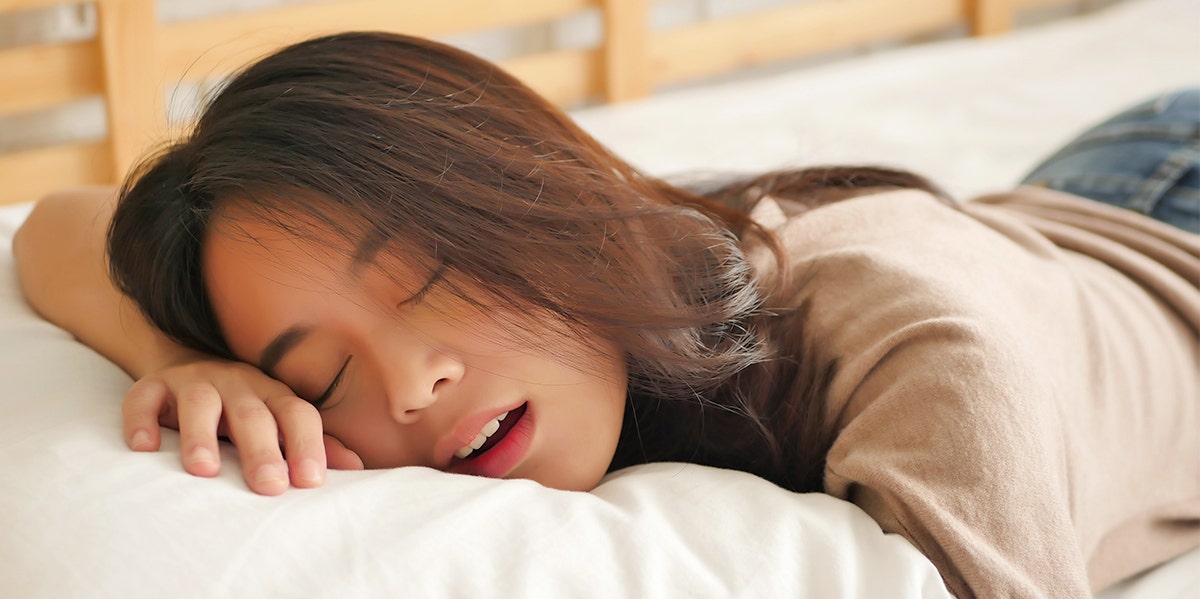What Happened When I Taped My Mouth Shut While Sleeping For 5 Days
No more mouth breathing.
 9nong / Shutterstock
9nong / Shutterstock By Karenna Meredith
Mouthbreather. If we're talking sleeping styles, the familiar Stranger Things insult could easily be flung my way. I've always maintained a "comfortable" sleep position for most of my life: laying on my stomach or side, head burrowed into a pillow, with my mouth slightly open. Drool? Embarrassing, but definitely present.
While my sleeping style is pretty much habitual, I recently noticed my quality of rest decreasing. It's definitely not terrible, but I'd often wake up in the middle of the night, sometimes with a sore throat, which I'd chalk up to seasonal allergies, and spend the remaining hours of my night chasing down the REM stage.
I saw a friend of mine post about using "mouth tape" at night; at first, I was skeptical and a little bit spooked. The goal of mouth taping is to force nose breathing while you sleep instead of relying heavily on your mouth. The idea seemed slightly uncomfortable to me, but I couldn't abandon the feeling that it might be the solution to my (minor) sleeping woes.

Photo: Author
According to SomniFix, a brand that offers its own line of hypoallergenic nighttime mouth strips, there are many benefits to taping before bed, including deep sleep, more efficient carbon dioxide-oxygen exchange, and reduced sinus and oral discomforts. All good things, right?
I decided to give mouth taping a try, partially for the claimed benefits and partially for my own entertainment. I'd be lying if I said I wasn't mostly slightly intrigued by the "weirdness" of it all.
After I settled on a five-day mouth taping experiment and ordered strips from Amazon, I was able to give them an up-close examination. Luckily, the adhesive strips come with a small breathing vent, so my boyfriend's fears of my suffocating could be quickly put at ease.
Night 1
I wasn't sure what to expect the first night I broke out the tape. Thanks to some handy instructions, I knew exactly where to place the individually packaged strip, but it still took me a little while to adjust to the sensation of having my lips taped together. I could definitely still breathe through the small vented panel, but it took some getting used to.
I used the Sleep Cycle app to help track my movements and sleep quality each night, which allowed me to look back and see an estimate of how restful (or restless) I'd been. I usually hover in the 70 to 80 percent sleep quality territory, so a dip into the low-60s was abnormal for me. I didn't want to discount the strips so easily, though, so on I continued to night two.
Night 2
By the second night, any fear or hesitations I had about mouth taping had vanished. Sure, the previous night's sleep hadn't been incredible, but I also made it through a full night's rest without ripping the tape from my mouth — that's a success in my book!
I was pleasantly surprised when I suddenly rose back into 80 percent territory overnight. I assumed the night before was simply my body getting used to the restrictive feeling, and now I was unconsciously embracing the power of mouth taping (literally).
Night 3
"Not so fast!" — Mouth strips to me and my newly inflated confidence.
The third night tricked me again, and I once more fell into a restless sleep, which included seven minutes of SNORING. I know everyone says this, but I never snore. Like, ever. While correlation doesn't equal causation, mouth taping's actually supposed to combat snoring, so color me confused when I picked up a habit I didn't have in the first place.
Night 4
At this point, I didn't know what to expect from mouth taping. Night four was a definite improvement from the evening before, and I could rip off the tape in the morning without a second thought, but I was still skeptical given the nightly inconsistencies.
Night 5
Ah, the final night. My sleep quality settled back into my usual rest territory and I didn't feel any more or less tired than at the beginning of this experiment.
Aside from the urgent need to dash out of bed and brush my teeth right after waking up (morning breath is so real when your mouth's been taped shut for seven hours), I didn't notice a huge change for the worse or the better in my sleep quality. It surprised me how little I was affected by this change in my routine.
Would You Try Mouth Taping?
I've tried this product again since concluding this trial run, and while I didn't notice any significant differences the second time around, there is something that feels oddly sci-fi about it. I'm in it as much for the novelty as I am for the professed benefits.
If you're intrigued by mouth tape, I would consult your doctor before giving it a go. Keep in mind that SomniFix does not recommend using these mouth strips if you have nasal breathing difficulties, have consumed alcohol or sedatives, have low blood pressure, or have other various medical difficulties.
So, would you give mouth taping a try?
PopSugar is a leading lifestyle brand for women that covers health, wellness, and everyday living.

